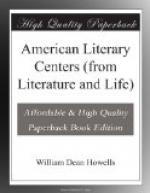It is an even thing: New York society has not taken to our literature. New York publishes it, criticises it, and circulates it, but I doubt if New York society much reads it or cares for it, and New York is therefore by no means the literary centre that Boston once was, though a large number of our literary men live in or about New York. Boston, in my time at least, had distinctly a literary atmosphere, which more or less pervaded society; but New York has distinctly nothing of the kind, in any pervasive sense. It is a vast mart, and literature is one of the things marketed here; but our good society cares no more for it than for some other products bought and sold here; it does not care nearly so much for books as for horses or for stocks, and I suppose it is not unlike the good society of any other metropolis in this. To the general, here, journalism is a far more appreciable thing than literature, and has greater recognition, for some very good reasons; but in Boston literature had vastly more honor, and even more popular recognition, than journalism. There journalism desired to be literary, and here literature has to try hard not to be journalistic. If New York is a literary centre on the business side, as London is, Boston was a literary centre, as Weimar was, and as Edinburgh was. It felt literature, as those capitals felt it, and if it did not love it quite so much as might seem, it always respected it.
To be quite clear in what I wish to say of the present relation of Boston to our other literary centres, I must repeat that we have now no such literary centre as Boston was. Boston itself has perhaps outgrown the literary consciousness which formerly distinguished it from all our other large towns. In a place of nearly a million people (I count in the outlying places) newspapers must be more than books; and that alone says everything.
Mr. Aldrich once noticed that whenever an author died in Boston, the New-Yorkers thought they had a literary centre; and it is by some such means that the primacy has passed from Boston, even if it has not passed to New York. But still there is enough literature left in the body at Boston to keep her first among equals in some things, if not easily first in all.
Mr. Aldrich himself lives in Boston, and he is, with Mr. Stedman, the foremost of our poets. At Cambridge live Colonel T. W. Higginson, an essayist in a certain sort without rival among us; and Mr. William James, the most interesting and the most literary of psychologists, whose repute is European as well as American. Mr. Charles Eliot Norton alone survives of the earlier Cambridge group—Longfellow, Lowell, Richard Henry Dana, Louis Agassiz, Francis J. Child, and Henry James, the father of the novelist and the psychologist.




